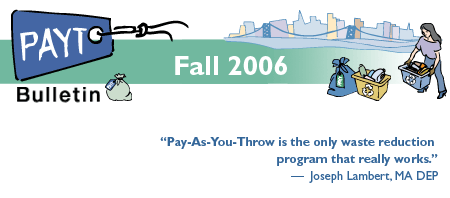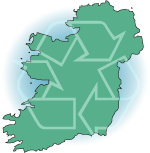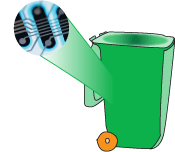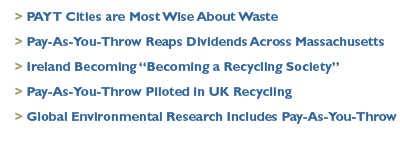PAYT Bulletin: Fall 2006


WasteWise Communities: Pay-As-You-Throw Cities Are Most Wise About Waste
 As if the advantages of Pay-As-You-Throw (PAYT) aren’t clear enough, one more compelling reason has just emerged. All communities interested in residential waste reduction will now be able to receive benefits and recognition by joining a U.S. Environmental Protection Agency (EPA) program called WasteWise.
As if the advantages of Pay-As-You-Throw (PAYT) aren’t clear enough, one more compelling reason has just emerged. All communities interested in residential waste reduction will now be able to receive benefits and recognition by joining a U.S. Environmental Protection Agency (EPA) program called WasteWise.
A new campaign known as WasteWise Communities was announced at the WasteWise Annual Conference, held this year in Arlington, Virginia, on October 19-20, 2006. WasteWise is a free and voluntary program for businesses, educational institutions, governments, and other entities, aimed at reducing trash and garbage (municipal solid waste) and certain industrial wastes.
While local governments have always been eligible to join the WasteWise program, they could only report on their internal waste reduction (office-wide or agency-wide). Through WasteWise Communities, local governments will have the opportunity to report reductions of residential household waste as a result of PAYT, recycling programs, or other incentives, and to gain recognition for such efforts through annual awards. WasteWise Communities is not targeting PAYT communities, but they certainly would have a big advantage with their higher-than- average waste reduction rates.
When launched, WasteWise Communities will offer benefits and resources similar to those of the main WasteWise program, but these will focus specifically on residential waste reduction to help support local governments. Participants in WasteWise Communities will have access to a toll-free helpline staffed by WasteWise information specialists that can answer both general program questions and specific technical questions on waste reduction. In addition, a technical assistance team is available to provide individual assistance to partners. EPA draws attention to individual accomplishments through a variety of activities, including the annual WasteWise awards program.
The “WasteWise Communities: City Climate Solutions” session, which attracted about 30 people from state and local governments and community-related non-government organizations, was the first time the new WasteWise Communities program was mentioned. Presenters included Kevin Drew, the residential and special project coordinator for the San Francisco Department of the Environment; Vicki Bushnell, the WasteWise coordinator in Kitsap County, Washington; and Kim Lundgren, director of the Northeast Regional Capacity Center for ICLEI.
PAYT, Drew explained, has actually existed in San Francisco since a 1932 refuse ordinance, but the city only recently worked out logistical kinks for areas like large apartment buildings. Thanks to the city’s exemplary PAYT-based composting and recycling program, however, San Francisco’s recycling rate in 2004 (64 percent) was more than twice the national average (30.6 percent). San Francisco is now focused on the “zero waste” concept, which the city hopes to achieve by 2020.
In Washington, PAYT has helped the city of Tacoma increase its recycling rate by 76 percent since 1974. In Seattle, which has been using PAYT since 1981, the city has set its sights on a 60-percent recycling rate by 2010. Kitsap County is continuing with other waste reduction measures as well such as an online community waste exchange and a “Reuse a Shoe” campaign that donated shoes and chipped and mixed others with tires and epoxy to produce a soft pavement for a community playground.
ICLEI, a worldwide coalition of local governments dedicated to achieving tangible improvements in global environmental conditions, encourages the use of PAYT in communities. In ICLEI’s Cities for Climate Protection Program, 78 percent of all environmental measures taken involve waste, including PAYT.
During the Question and Answer period of the WasteWise Communities session, Joseph Lambert from the Massachusetts Department of Environmental Protection (MassDEP) delivered an impassioned endorsement of PAYT. In Massachusetts PAYT communities, residents are charged $25 to $104 per ton for trash disposal, which has helped to increase recycling rates to 40 percent and has helped decommission hundreds of unlined landfills. MassDEP provides startup grants for cities and towns in the state to adopt PAYT. “Pay-As-You-Throw,” Lambert concluded, “is the only [waste reduction] program that really works.”
Stay tuned for more information about joining WasteWise Communities.
Pay-As-You-Throw Reaps Dividends Across Massachusetts
 Pay-As-You-Throw (PAYT) has become so successful in Massachusetts that it’s scarcely news when yet another community in the Commonwealth begins implementing it—more than 117 towns are already doing so. Nevertheless, Massachusetts now boasts nine new additions to its ever-growing PAYT family since 2005.
Pay-As-You-Throw (PAYT) has become so successful in Massachusetts that it’s scarcely news when yet another community in the Commonwealth begins implementing it—more than 117 towns are already doing so. Nevertheless, Massachusetts now boasts nine new additions to its ever-growing PAYT family since 2005.
With assistance from Massachusetts Department of Environmental Protection (DEP) grants, PAYT has attracted cities like Attleboro, with a population of 41,103 people, as well as small towns like Northfield, with less than 3,000 residents.
Massachusetts PAYT coordinator Joseph Lambert attributes the program’s success to multiple factors: limiting Massachusetts to 17 landfills and five combustors; banning “everything you can think of that is hazardous or recyclable” from the trash; informing elected officials about the program’s benefits; and offering two types of DEP grants, which enable municipalities without enough money or manpower to make PAYT work for them.
“We show elected officials it’s not always a political risk to launch these programs,” Lambert said. “It’s leadership and taking a stand. Good public policy, in other words, and not just a gimmick.”
Several towns in Western Massachusetts—Greenfield, East Longmeadow, Longmeadow, and Northfield—offer excellent recent case studies. Each town’s program differs slightly, but all four experienced lower waste collection, reduced disposal costs, increased recycling rates, and increased town revenue from recycling—unanimously exceeding the towns’ original expectations for their PAYT programs.
Greenfield experienced the most dramatic results from PAYT, saving $87,259 during the first 10 months from avoided disposal costs alone. Greenfield implemented a PAYT bag program in July 2005, charging residents $1.50/large bag (33-gallon) and $0.75/small bag (16-gallon). Trash and recycling are collected weekly at the curbside.
Proving that imitation is indeed the best form of flattery, East Longmeadow’s program, also started in July 2005, was so successful that the neighboring town of Longmeadow adopted the same PAYT model nearly a year later. East Longmeadow and Longmeadow offer residents a basic service model: one 35-gallon (36-gallon in Longmeadow) trash bag or barrel is paid for within the tax rate, but extra trash must be left out for weekly collection in a special 33-gallon trash bag that the towns sell for $1.50 ($1.75 in Longmeadow). Recycling is also collected curbside.
The town of Northfield adopted a PAYT bag program in October 2005. Residents must place all trash in designated Northfield trash bags sold for $2.00/large bag (33-gallon) and $0.75/small bag (16-gallon). Trash and recycling are collected at the town’s drop-off facility. The town realized additional savings by reducing the number of municipal solid waste hauls from 10 times a month to four times. At $179 per haul, this simple change saves Northfield more than $1,000 each month.
Pay-As-You-Throw Program Results |
||||||
Town |
Trash Reduced (tons) |
% Trash Reduced |
Disposal Money Saved |
Recycling Increase (tons) |
% Recycling Increase |
Money from Recycling * |
Greenfield |
1229 |
24% |
$87,259 |
798 |
62% |
$58,520 |
East Longmeadow |
943 |
22% |
$66,953 |
169 |
12% |
$43,484 |
Northfield |
99 |
30% |
$7,029 (only 6 months) |
13 |
10% |
$4,648 (only 6 months) |
Source: Springfield Materials Recycling Facility
* The numbers above do not reflect the revenue from bag sales, which is a built-in fee designed to cover both the cost of the bags and part of the town’s disposal costs.

Ireland “Becoming a Recycling Society,” Says Government Official
 Ireland has been aggressively tackling waste reduction and recycling issues, setting an example for the European Union (EU) and the rest of the world. Repak, Ireland’s packaging recycling service, recently identified the increased availability of “Pay-By-Use” ( Ireland’s equivalent of Pay-As-You-Throw) as a critical element in the country’s formula for boosting recycling rates.
Ireland has been aggressively tackling waste reduction and recycling issues, setting an example for the European Union (EU) and the rest of the world. Repak, Ireland’s packaging recycling service, recently identified the increased availability of “Pay-By-Use” ( Ireland’s equivalent of Pay-As-You-Throw) as a critical element in the country’s formula for boosting recycling rates.
Back in 2004, the PAYT Bulletin reported that Ireland was the first country in the world to implement a tax on plastic shopping bags, thereby cutting their use by 90 percent. Taxes were also imposed on polystyrene food wrappers, cash machine receipts, and other wastes to fund litter cleanup and recycling centers. Recycling programs grew in number, funded by subsidies from producers. In March of 2004, Environmental Minister Martin Cullen announced a nationwide mandate for the implementation of Pay-By-Use residential waste collection service.
The mandate required local authorities and private waste haulers to restructure their billing procedures by January 1, 2005. Residents are now charged by the weight of their trash, although specific rate structures and formulas are left for waste collectors to determine. This flexibility allows collectors freedom in designing their own systems, which can take unique local circumstances into account.
The current Minister for the Environment, Heritage and Local Government, Dick Roche, T.D., spoke about Pay-By-Use recently at the Repak Recycling Awards Gala Dinner. According to the most recent figures from his department, nearly 90 percent of private waste operators now offer a service on the basis of Pay-By-Use, while the equivalent figure for local authority services is 95 percent. Roche cited an increase in packaging waste recycling rates from 15 percent in 1998 to more than 56 percent in 2004, exceeding targets set by the EU. A new target of 60 percent has been introduced for 2011, but given the country’s zeal for recycling and rapid progress in waste reduction, Roche expects the country to surpass that goal before the decade is out.
“The recycling landscape has been radically transformed in recent years,” Roche said. “There are nearly 2,000 bring banks around the country and more than 70 recycling centers. The public has shown a real enthusiasm for recycling, and with segregated collections available to more and more homes, recycling rates have been surging ahead—we are becoming a recycling society.”
We are most likely very close to achieving our 2011 targets for recovering and recycling packaging waste now,” said the minister. “I would urge everyone involved to press on and maximize the level of recycling in the years ahead.”
Bugged Bins: Pay-As-You-Throw Piloted in UK Recycling
 With Europe’s third-to-worst recycling rate, England is considering a high-tech Pay-As-You-Throw (PAYT) program to reduce the country’s garbage and avoid stiff fines from European Union legislation on landfills.
With Europe’s third-to-worst recycling rate, England is considering a high-tech Pay-As-You-Throw (PAYT) program to reduce the country’s garbage and avoid stiff fines from European Union legislation on landfills.
More than 30 communities are fitting microchips into collection bins in anticipation of possible PAYT programs, reported the BBC News. As of August 2006, 500,000 trash bins had received “bugs” to record homes’ waste habits.
The chips carry a unique serial number that can be scanned by collection trucks to identify which property owns the bin. Trucks equipped with scales can use these “bugs” to record the weight of each household’s rubbish to within 500 grams (1.1 pounds).
EU Recycling Rates
- Netherlands: 65%
- Austria: 59%
- Germany: 58%
- Belgium: 52%
- Sweden: 41%
- Denmark: 41%
- Luxembourg: 36%
- Spain: 35%
- Ireland:31%
- Italy: 29%
- Finland: 28%
- France: 28%
- UK: 18%
- Greece: 8%
- Portugal: 3%
The UK recycled or composted only 18 percent of its waste in 2003 and 2004, according to the Institute for Public Policy Research (IPPR). In Europe, the only countries that fared worse are Greece and Portugal, at 8 percent and 3 percent, respectively. By contrast, the Netherlands recycles 65 percent of its waste.
England has four years to catch up; by 2010, the European Union (EU) landfill legislation requires member-states to cut the amount of biodegradable waste they send to landfills by 25 percent of that produced in 1995. Waste reductions must reach half the 1995 figures in 2013 and two-thirds by 2020.
Local authorities face tough fines from the government—up to £150 ($282) per ton of trash—if England fails to meet the EU directive, and the country will have to meet 40 percent of the 2010 recycling targets to avoid EU sanctions.
The hope is that new PAYT programs, with financial incentives for recycling and against landfilling, rather than the current flat tax, will help England dig its disposal habits out of a hole.
“The government should give local authorities powers to charge for collecting nonrecyclable waste,” said IPPR director Nick Pearce. “Our European neighbors have shown that where charges are commonplace, recycling rates will rise.”
Global Environmental Research Includes Pay-As-You-Throw
Sometimes the best way to solve a problem is to make sure you’re asking the right questions. Sticking to this credo, the Organization for Economic Co-operation and Development (OECD) is spearheading an ongoing project to identify public attitudes and behaviors toward environmental issues. Household waste generation and recycling habits—including Pay-As-You-Throw (PAYT)—is one of four key issues being researched by the international think-tank.
 The project is launching a comparative survey of households across a half dozen countries to give governments the data needed to improve their environmental policies. Even before it conducts the survey, however, OECD completed background studies on the four targeted environmental issues. It also requested feedback from the global community at a workshop in Paris last summer attended by more than 60 experts as well as representatives from 14 member countries, the European Commission, and other international organizations. Findings related to PAYT include the following:
The project is launching a comparative survey of households across a half dozen countries to give governments the data needed to improve their environmental policies. Even before it conducts the survey, however, OECD completed background studies on the four targeted environmental issues. It also requested feedback from the global community at a workshop in Paris last summer attended by more than 60 experts as well as representatives from 14 member countries, the European Commission, and other international organizations. Findings related to PAYT include the following:
-
Unit-based pricing collection systems are more effective than flat-fee pricing systems at reducing household waste and/or increasing recycling.
-
Unit-based pricing appears to be more effective at reducing waste when combined with a recycling program or deposit-refund system.
-
Information campaigns to boost recycling typically focus on just the environmental consequences of not recycling. These campaigns could be more effective if they incorporate other social motivations, such as expectations from neighbors.
-
Public services like recycling can be targeted to more responsive household types. For example, if multi-family apartments tend to recycle less than single-family homes, implementing recycling programs uniformly across a community might not be cost-effective.
-
Evidence indicates that the demand for garbage services increases with income, and that poorer households tend to be less responsive to recycling programs. This suggests that user fees in waste and recycling collection programs that fail to provide some type of “lifeline” rates may place proportionally higher taxes on people with lower incomes, compared to the wealthy.
A better understanding of what determines household behavior is required to inform policymakers on how best to influence residential energy use, household waste generation and recycling, personal transportation choices, and organic food consumption.
PAYT in the News
In a recent "Ask Umbra" column ![]() in Grist , an online magazine, Umbra reminded readers that PAYT programs help reduce waste.
in Grist , an online magazine, Umbra reminded readers that PAYT programs help reduce waste.
We Want to Hear from You!
EPA would like to promote YOU and your PAYT successes and
experiences. Whether you are a community just starting PAYT,
one that has been doing it for years, or anywhere in between,
we want to hear from you!
We are interested in information on new programs, program
expansions, lessons learned, challenges overcome, advice,
changes, trends, new documents or reports, community reactions,
or any other aspect of your PAYT experiences that could be
useful to others.
Please send us an email at payt@icfi.com with your name, affiliation/community, address, phone number, email address, and a brief synopsis of your news. Please also let us know the population of your community and when you started PAYT. We will contact you for more information and include you in our online PAYT Bulletin and/or other informational materials about PAYT. One of the benefits of being part of a progressive, conservation-minded municipal program is the recognition you receive. Don't pass up this opportunity!
Spread the Word!
Please spread the word about PAYT to your neighboring communities, association members, and others in the solid waste arena. Because all of our correspondence will be via email from now on, please send an email to us at payt@icfi.com with email addresses of anyone you think would be interested in joining our mailing list and receiving the PAYT Bulletin.
EPA530-N-06-007
![[logo] US EPA](../gif/logo_epaseal.gif)
